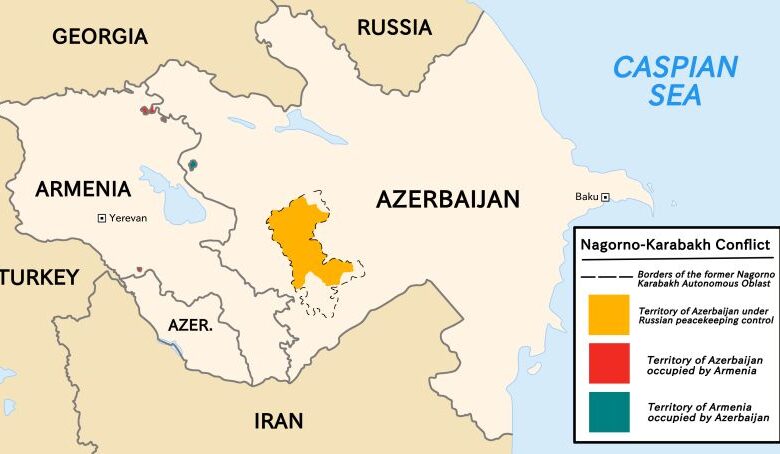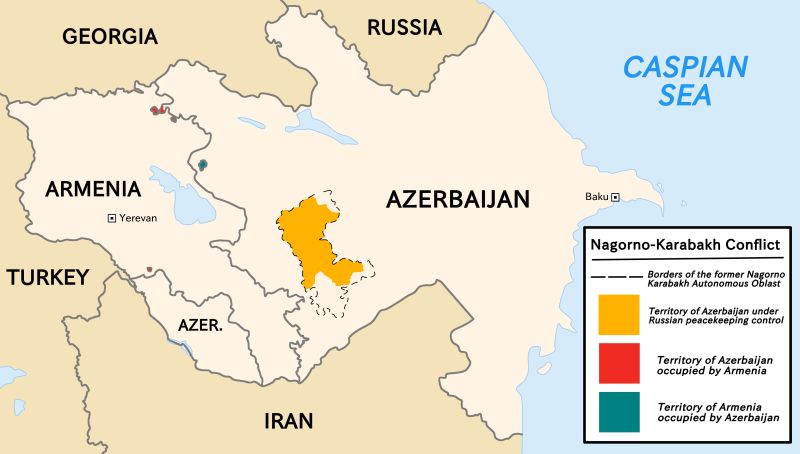Azerbaijan demands Armenia hand over 8 villages it says are ‘under occupation’

 Map of the Nagorno-Karabakh conflict following the 2020 Nagorno-Karabakh war. / Credit: Golden|Wikipedia|CC BY-SA 4.0
Map of the Nagorno-Karabakh conflict following the 2020 Nagorno-Karabakh war. / Credit: Golden|Wikipedia|CC BY-SA 4.0 Washington, D.C. Newsroom, Nov 9, 2023 / 17:39 pm (CNA).
Peace talks between the Christian nation Armenia and its Muslim neighbor Azerbaijan hit a snag this week when the Azerbaijani government issued a demand that eight villages along the border be turned over.
The demand follows a military campaign by Azerbaijan in which it seized control of the Nagorno-Karabakh enclave in September, resulting in the emptying of nearly all Christians from the region.
Armenia is one of the few Christian countries in the region and is landlocked by the larger, Muslim nations Azerbaijan and major regional power Turkey on either side.
The Azerbaijani Foreign Ministry said that the eight villages are historically part of Azerbaijan and that they are being occupied by the Armenian military.
The issue was raised by Azerbaijani President Ilham Aliyev in a phone call with European Council President Charles Michel this past week, according to Armenian-American news source Asbarez. Asbarez reported that after the conversation with Michel, Aliyev opted not to attend a peace talk scheduled for Sunday.
The Azerbaijani Foreign Ministry said in a Tuesday statement that Armenia was “once again hindering peace agreement negotiations” by refusing to “hand over eight Azerbaijani villages, which are still under occupation.”
Though the foreign ministry statement does not specify which villages it is referring to, Thursday report by Asbarez said that “an entry in the Azerbaijan’s president’s website mentions seven villages in Armenia’s Tavush Province [northern Armenia] and one village in the Ararat Province [central west Armenia] bordering Nakhichevan, which in the 1990s fell under Armenia’s control.”
The Azerbaijani foreign ministry demanded Armenia hand over the villages to “demonstrate a constructive and just position in the peace process” and to show they “understand the realities in the region properly.”
Azerbaijan said that though there are “ample opportunities for peace and stability in the region,” there is “no alternative” to Armenia ceding the villages to Azerbaijani control.
According to Asbarez, Armenian Prime Minister Nikol Pashinyan responded to Azerbaijan’s demands in an Armenian Public Television interview on Tuesday.
Asbarez reported that “Pashinyan said the future of these contested lands should be decided through a delimitation of the Armenian-Azerbaijani border” and that “he hinted that Yerevan is open to considering territorial swaps as part of that process.”
Both former Soviet territories, the two nations have been engaged in on-again, off-again conflict for decades. Tensions reached a breaking point once again on Sept. 19 when the Azerbaijani military launched what it called “anti-terrorism measures” to assert its control of the majority ethnically Armenian Nagorno-Karabakh region.
The campaign resulted in over 200 dead Armenians and a mass evacuation of over 100,000 ethnic Armenians from Nagorno-Karabakh.
Despite ongoing peace talks, the two nations have continued to exchange periodic fire and to engage in minor clashes at their border.
During the Sept. 19 conflict, Pashinyan publicly conceded Azerbaijan’s right to Nagorno-Karabakh and staunchly denied that Armenian troops were helping ethnic Armenians in the enclave.
Since Azerbaijan seized Nagorno-Karabakh, Pashinyan has been a vocal advocate for peace between the two countries and has proposed that any peace agreement be based on each nation respecting each other’s territorial sovereignty.
During a presentation at the annual Silk Road International Conference in Tbilisi, Georgia, on Oct. 26, Pashinyan said that both Armenia and Azerbaijan must “mutually recognize each other’s territorial integrity.”
Pashinyan said that both nations’ borders must remain at their current sizes, with Armenia at 29,800 square kilometers and Azerbaijan at 86,600 square kilometers.
“This encyclopedic reference,” Pashinyan said, “was meant to ensure that statements made by Armenia and Azerbaijan about recognition of each other’s territorial integrity leave no room for claiming that by recognizing the other country’s territorial integrity, one of the countries has in mind only a part of its internationally recognized territory.”
U.S. State Department spokesperson Vedant Patel said in a Wednesday press conference that peace between Armenia and Azerbaijan is a “priority” for the United States and that “it’s something that the department will continue to engage towards.”






